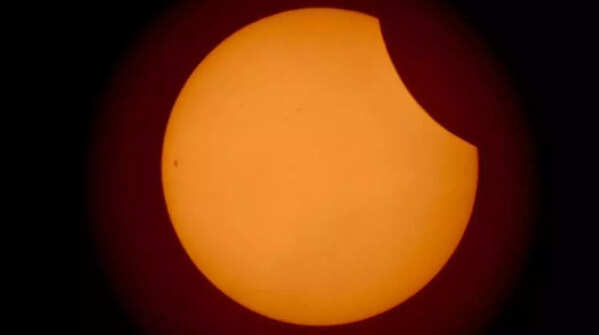Partial solar eclipse 2025: Beautiful pictures of the celestial event

First solar eclipse of 2025
The first partial solar eclipse of 2025 occurred today on March 29th, 2025. The rare celestial phenomenon has people in most parts of the world excited to see a beautiful sight.
Image credits: X/@ProfRamanPrinja

A rare partial solar eclipse
Additionally, with the predictions of a devil's horns eclipse, fans of astronomy were up for waiting for hours to see the stunning sight. As predicted by NASA, the eclipse was visible in Europe, Northwestern Africa, Greenland, Iceland, some parts of the northeastern US and eastern Canada.
Image credits: @JamesSinko/X

Was it visible in India?
In India, the eclipse started at 2:30 pm IST and it will go on till 6:00 pm IST, with its peak being 4:00 pm IST. However, it was not visible due to the alignment of the event. As per reports, this partial solar eclipse will also have a double sunrise, which is a rare sight where the Sun appears to rise twice in a day!
Image credits: @Ian_M1/X

Partial solar eclipse in the US
In the US, the eclipse began at 4:50 am EDT and concluded at 8:43 am EDT, with its peak at 6:47 am. In New York, the eclipse was visible from 6:35 AM to 7:12 AM, whereas in Pennsylvania, the sight was visible from 6:46 AM to 7:08 AM. Residents of New Jersey could see the eclipse from 6:43 AM to 7:06 AM, and Virginia experienced the eclipse from 6:50 AM to 7:03 AM.Image credits: @Reemus22/X

Partial solar eclipse in Europe
In Europe, the partial solar eclipse began at 10 AM GMT to 12 PM GMT, with its peak at 11:03 AM GMT. According to timeanddate.com, in the UK, the partial solar eclipse occurred at 10:07 AM.
The last to see the eclipse will be Siberia from 8:50 AM GMT to 12:43 AM GMT.
Image credits: @MattRaccuglia/X

Canada to have the best view of the partial solar eclipse 2025
As forecasters from The Weather Channel predicted, Quebec, Canada is to have the best view of the partial solar eclipse with 93.1% of the sun swallowed by the moon.
Image credits: X

Solar eclipses in 2025
The partial solar eclipse on March 29 was the first solar eclipse of this year. The second solar eclipse of 2025 is predicted to be on September 21. For the unversed, a solar eclipse occurs when the Moon comes between the Sun and the Earth, and the three celestial bodies are aligned perfectly in a straight line. Due to this, the Moon blocks the Sun's rays from reaching the Earth, thus leading to a stunning visual event.Image credits: @munarwalk/x







